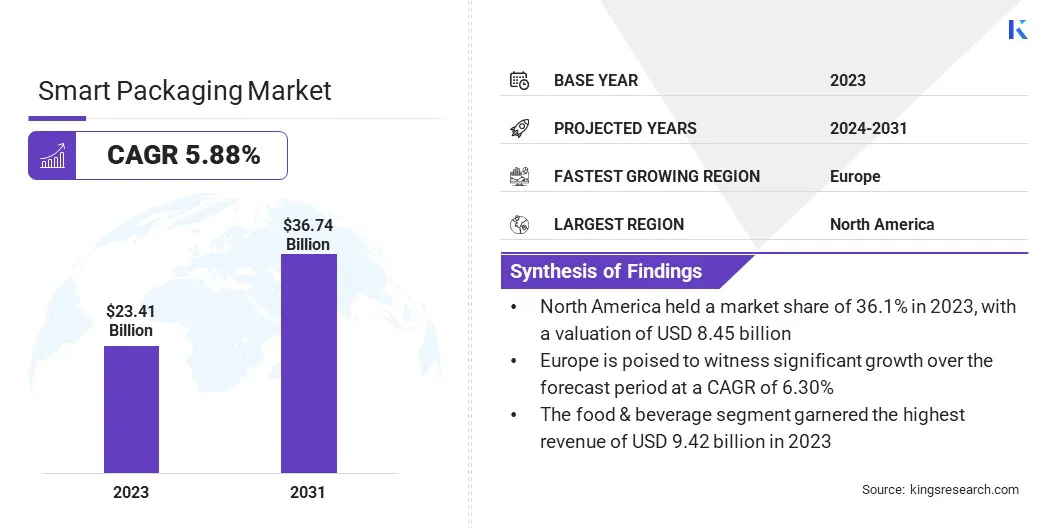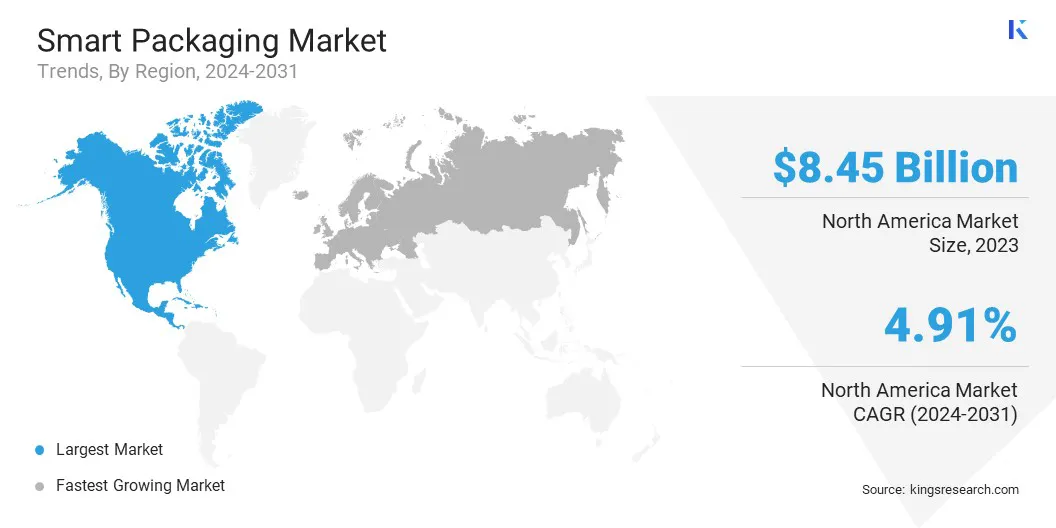Smart Packaging Market Size
The global Smart Packaging Market size was valued at USD 23.41 billion in 2023 and is projected to reach USD 36.74 billion by 2031, growing at a CAGR of 5.88% from 2024 to 2031. In the scope of work, the report includes products offered by companies such as Amcor plc, Sonoco Products Company, Sealed Air Corporation, Stora Enso Oyj, Huhtamäki Oyj, Avery Dennison Corporation, Smurfit Kappa Group, BASF SE, 3M Company, Tetra Pak International S.A. and Others.
The smart packaging market growth is driven by the increasing demand for advanced packaging solutions across various industries. Factors such as rising consumer awareness regarding product safety and sustainability, evolving regulatory standards, and technological advancements are fueling market expansion.
Moreover, the food and beverage industry is witnessing a surge in the demand for smart packaging solutions, backed by the need for enhanced product safety, extended shelf life, and preservation of freshness.
In the food and beverage industry, smart packaging employs technologies such as oxygen scavengers, moisture absorbers, and antimicrobial agents to actively interact with the packaged product, maintaining its quality throughout the supply chain. Consumers are increasingly seeking products that offer convenience and assurance of freshness, leading manufacturers to adopt smart packaging solutions to meet these expectations.
Additionally, stringent regulations regarding food safety and sustainability are propelling the adoption of smart packaging technologies. As consumers become more conscious about the environmental impact of packaging waste, there is a growing preference for sustainable packaging materials. This factor is anticipated to shape the food and beverage industry in the upcoming years.
Smart packaging refers to the integration of various technologies into packaging materials or systems to provide additional functionalities beyond traditional packaging. These functionalities include real-time monitoring, tracking, authentication, and communication with consumers or other devices.
Smart packaging finds applications across diverse industries such as food and beverage, pharmaceuticals, personal care, and others. In the food industry, smart packaging helps in ensuring food safety, quality, and traceability throughout the supply chain.
In pharmaceuticals, it aids medication adherence, counterfeit prevention, and temperature-sensitive drug monitoring. The evolution of smart packaging is driven by advancements in sensor technologies, connectivity, and data analytics, enabling more sophisticated functionalities and improved efficiency.
However, the adoption of smart packaging is influenced by regulatory requirements, particularly concerning product safety, labeling, and data privacy. Compliance with these regulations is crucial for ensuring consumer trust and market acceptance of smart packaging solutions.

Analyst’s Review
Key firms in the smart packaging market are investing in research and development to innovate new smart packaging solutions that address specific industry needs and regulatory requirements. Additionally, industry stakeholders are focusing on forging strategic partnerships and collaborations with technology providers, industry players, and regulatory bodies to facilitate access to expertise, resources, and market opportunities.
Moreover, key companies are prioritizing sustainability by utilizing eco-friendly materials and adopting recyclable or biodegradable packaging solutions to align with growing consumer preferences for environmentally conscious products.
Furthermore, utilizing data analytics and artificial intelligence to extract actionable insights from smart packaging data enables companies to optimize supply chain operations, enhance product quality, and personalize consumer experiences, which positively influences the industry outlook.
Smart Packaging Market Growth Factors
Pharmaceutical companies are increasingly implementing intelligent packaging technologies to address the growing demand for enhanced medication safety, compliance, and patient engagement.
Intelligent packaging solutions integrate features such as RFID tags, temperature sensors, and tamper-evident labels to enable real-time monitoring, tracking, and authentication of pharmaceutical products throughout the supply chain. These technologies help prevent counterfeit drugs, ensure proper storage conditions, and provide patients with essential information about medication dosage and usage.
Additionally, intelligent packaging facilitates remote patient monitoring and medication adherence through interactive features such as reminders and dosage tracking. The adoption of intelligent packaging technologies by pharmaceutical companies is driven by regulatory requirements for serialization, traceability, and anti-counterfeiting measures.
Pharmaceutical companies are prioritizing patient safety and regulatory compliance, which is projected to fuel the demand for intelligent packaging solutions in the foreseeable future. However, the integration of smart technologies into existing packaging systems incurs high initial investments.
Integrating sensors, RFID tags, or other smart components into packaging materials requires specialized expertise and entails modifying production processes, which are time-consuming and costly. Moreover, the upfront investment in acquiring the necessary technologies, infrastructure, and personnel for implementing smart packaging solutions poses financial barriers for many firms, particularly small and medium-sized enterprises.
To overcome this challenge, industry players, research institutions, and technology providers are offering guidance, support, and shared resources to streamline the integration process and reduce costs. Additionally, incentivizing investments in smart packaging through government grants, subsidies, or tax incentives is anticipated to encourage broader adoption and innovation in the smart packaging market.
Smart Packaging Market Trends
The smart packaging market is witnessing a growing trend toward the adoption of Near Field Communication (NFC) technology for interactive packaging experiences and the integration of blockchain technology for enhanced supply chain transparency and authentication.
NFC-enabled packaging allows consumers to interact with products using their smartphones, accessing information such as product origin, ingredients, usage instructions, and promotional offers. This enhances consumer engagement and brand loyalty provides valuable insights into consumer preferences and behavior.
On the other hand, blockchain technology enables secure and immutable recording of product information and transactions across the supply chain. By utilizing blockchain technology, stakeholders track the movement of products from manufacturing facilities to end consumers, mitigating the risks of counterfeit products, theft, and diversion.
- These trends are driving market growth by enhancing product visibility, trust, and efficiency in supply chain operations. The widespread adoption of NFC and blockchain technologies is poised to revolutionize the smart packaging landscape, offering new opportunities across various industries.
Segmentation Analysis
The global market is segmented based on type, application, and geography.
By Type
Based on type, the smart packaging market is segmented into active packaging, intelligent packaging, and modified atmosphere packaging. The modified atmosphere packaging (MAP) segment secured the largest revenue share of 48.50% in 2023 due to its widespread adoption across diverse industries, including food and beverage, pharmaceuticals, and personal care.
MAP involves modifying the composition of gases within the packaging environment to extend the shelf life and preserve the quality of perishable products. By reducing oxygen levels and controlling moisture and gas exchange, MAP helps inhibit microbial growth, delay enzymatic reactions, and prevent oxidative deterioration of packaged goods.
This technology is particularly popular in the food industry for preserving fresh produce, meat, poultry, seafood, bakery products, and ready-to-eat meals. Additionally, MAP offers various benefits such as reduced food waste, improved product safety, and extended distribution reach, driving its preference among manufacturers and consumers.
By Application
Based on application, the market is classified into food & beverage, pharmaceuticals, personal care & cosmetics, and others. The food & beverage segment led the smart packaging market in 2023, reaching a valuation of USD 9.42 billion, owing to the increasing demand for innovative packaging solutions that ensure product safety, quality, and convenience in the food and beverage industry.
Smart packaging technologies such as active packaging, intelligent packaging, and modified atmosphere packaging are extensively utilized by food and beverage manufacturers to address challenges related to perishability and contamination. Consumers are increasingly seeking packaged foods and beverages that offer longer shelf life, freshness, and nutritional value, which is driving the adoption of smart packaging solutions.
Additionally, stringent regulations regarding food safety and labeling requirements are prompting companies to invest in smart packaging technologies to comply with industry standards and regulatory mandates.
Smart Packaging Market Regional Analysis
Based on region, the global market is classified into North America, Europe, Asia-Pacific, MEA, and Latin America.

The North America Smart Packaging Market share stood around 36.1% in 2023 in the global market, with a valuation of USD 8.45 billion. The region boasts a robust economy with notable technological advancement, which is fostering innovation and adoption of smart packaging solutions across various industries. The region, with its large consumer base, is observing an upsurge in the demand for packaged goods, including food and beverages, pharmaceuticals, and personal care products.
In addition, stringent regulations and standards concerning product safety, traceability, and sustainability are prompting companies in the region to invest in smart packaging solutions to ensure compliance and maintain consumer trust.
Moreover, increasing awareness among consumers regarding health and environmental concerns is propelling the demand for smart packaging solutions that offer enhanced protection, convenience, and eco-friendliness. With ongoing investments in research and development, strategic partnerships, and technological advancements, North America is poised to maintain its leading position in the market in the upcoming years.
The Europe smart packaging market is poised to grow substantially at a robust CAGR of 6.30% over the forecast period. The region has a well-established packaging industry known for its innovation, quality standards, and sustainability initiatives, which create a conducive environment for the adoption of smart packaging solutions.
Increasing regulatory emphasis on product safety, environmental protection, and circular economy principles is driving the adoption of smart packaging technologies that offer improved traceability, recyclability, and reduced environmental footprint.
Additionally, growing consumer awareness and preferences for convenience, authenticity, and transparency in packaged products are fueling the demand for smart packaging solutions. By leveraging these opportunities, Europe is anticipated to emerge as a key market for smart packaging solutions in the upcoming years.
Competitive Landscape
The smart packaging market report will provide valuable insight with an emphasis on the fragmented nature of the industry. Prominent players are focusing on several key business strategies such as partnerships, mergers and acquisitions, product innovations, and joint ventures to expand their product portfolio and increase their market shares across different regions.
Strategic initiatives, including investments in R&D activities, the establishment of new manufacturing facilities, and supply chain optimization, could create new opportunities for market growth.
List of Key Companies in Smart Packaging Market
Key Industry Developments
- November 2023 (Partnership): Marley Spoon partnered with Evigence to introduce smart packaging solutions for their meal kit range. Utilizing Evigence's freshness monitoring solution, the collaboration aimed to enhance food quality and safety throughout the supply chain. This partnership signified a strategic move toward integrating innovative technology into meal delivery services to meet consumer demands for fresher, more convenient food options.
- April 2023 (Partnership): Tetra Pak collaborated with Appetite Creative to create an engaging smart packaging experience for Rauch, a prominent European fruit juice producer. Focused on passion fruit, pineapple, and mango flavors, the interactive packaging featured a web app accessible via QR codes. Customers could take a personality test to discover their ideal juice drink, with tailored recipes for both alcoholic and non-alcoholic beverages. This innovative approach aimed to educate and inspire consumers while promoting product customization and experimentation.
The Global Smart Packaging Market is Segmented as:
By Type
- Active Packaging
- Intelligent Packaging
- Modified Atmosphere Packaging
By Application
- Food & Beverage
- Pharmaceuticals
- Personal Care & Cosmetics
- Others
By Region
- North America
- Europe
- France
- U.K.
- Spain
- Germany
- Italy
- Russia
- Rest of Europe
- Asia-Pacific
- China
- Japan
- India
- South Korea
- Rest of Asia-Pacific
- Middle East & Africa
- GCC
- North Africa
- South Africa
- Rest of Middle East & Africa
- Latin America
- Brazil
- Argentina
- Rest of Latin America


